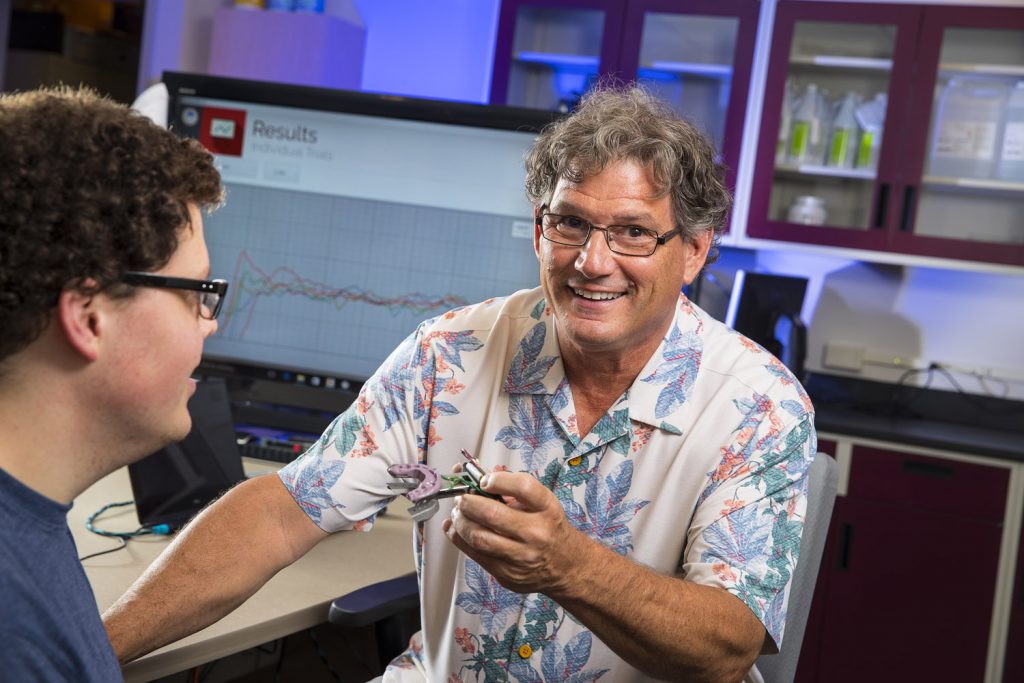- Menu
-
Enhancing Sorghum for Biofuel Production
Food, Energy and Water
-
Getting to the Root of Crop Improvements
Plant Science
-
New Chancellor Envisions Bold Future for Research
Leadership
-
NU FEWS Sparks Innovation in Food, Energy and Water
Food, Energy and Water
-
Closing Achievement Gap for Kids
Early Childhood
-
Enhancing Early Childhood Development
Early Childhood
-
Drones Could Help Fight Fire with Fire
Unmanned Aerial Vehicles
-
Surprising Discovery Contradicts Predictions
X-ray Material
-
Laser Creates Surfaces that Mimic Nature
Laser Research
-
USSTRATCOM Delegation Visits UNL
Defense Research
-
Prospecting with Biosensors at Home or in the Field
Chemistry
-
Gift Creates Johnny Carson Emerging Media Arts Center
Media Arts
-
System Helps Diagnose, Treat Brain Damage
Health
-
UNL Hosts University, Industry Leaders
Industry Relations
-
Momentum Builds on Nebraska Innovation Campus
Economic Development
-
Bioinformatics Focus for NIC’s First Faculty Startup
Bioinformatics
-
Improving Surgery through Robotics
Robotics
-
CD Celebrates Collaboration with Philip Glass
Performing Arts
-
Strengthening Region’s Nanotech Assets
Nanoscience
-
Geospatial Technology Helps Restore Wetlands
Environment
-
Maximizing Innate Talent
Leadership
-
Early Career Awards Boost Promising Research
Honors
-
Research Highlights
-
Accolades
-
Financials
-
Credits
-
On the Cover
- PDF version
System Helps Diagnose, Treat Brain Damage
Even slight movements of the face, mouth and fingers can yield insights into the brain that controls them. The ability to precisely measure the muscle forces driving those movements could improve diagnosis and treatment of nervous system maladies ranging from stroke and traumatic brain injuries to Parkinson’s disease and autism.
Steven Barlow, associate director of UNL’s Center for Brain, Biology and Behavior and the Corwin Moore Professor of Special Education and Communication Disorders, teamed with students in the Jeffrey S. Raikes School of Computer Science and Management to refine a novel system that does just that.
Known as ForceWIN10, the technology features custom software and pressure sensors that collectively cost only a few hundred dollars. In a matter of minutes, the system wirelessly measures and records how much force is generated – and how well that force is controlled – by muscle groups essential to the fine motor control required for daily tasks such as eating, speaking and typing.
“To be able to accurately sample force in this way, diagnostically, is a window into the intact brain and also the damaged brain,” Barlow said. “It gives clinicians, really for the first time, a set of objective measurements that they can use not only for diagnostics but … as a therapeutic feedback device.”

Barlow is refining the technology through a partnership with Lincoln’s Madonna Rehabilitation Hospital, which is testing a prototype of the system. Raikes School students in mechanical and materials engineering, electrical and computer engineering, and computer science have helped construct multiple prototypes and program updates to the system’s software.
Barlow began collaborating with the Raikes School at the recommendation of NUtech Ventures, UNL’s technology commercialization affiliate, which is helping Barlow patent the system.
“NUtech Ventures really is a catalyst for innovation, and we are very fortunate to have the opportunity to participate in this kind of technology transfer project,” said Ian Cottingham, director of the Raikes School Design Studio. “This is what innovation is all about: partnerships, teamwork and making a product that makes a difference.”
